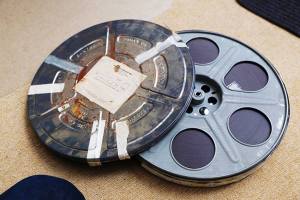
We were so sad to hear that Garry Goodrow passed away this week. He is such an important piece of The Committee’s story, and while we did get some strong footage of him when he visited SF for last year’s reunion, we didn’t get enough. We look forward to learning more about him, and we will tell his story, but we can no longer get more from him firsthand and that, frankly, sucks.
Garry was an original member of The Committee. He was hired after some success with the Living Theater (he played a major role in the original stage production and film adaptation of Jack Gelber’s Beat era classic, The Connection). Alan Myerson originally wanted Alan Arkin. When Arkin was cast in a show on Broadway, he suggested Goodrow take his place.
If The Committee was a collective of comedian-activists, Garry embodied the role perfectly. He was on the streets as a leader/emcee for the Vietnam Day march in Oakland in 1965. He was a go-to emcee for every kind of counter-culture benefit and rock show throughout the sixties. In the early seventies, when Jane Fonda started the Fuck The Army (FTA) tour, Garry signed on to replace the overworked, burned-out Elliott Gould. Lindsay Goss, a graduate student who is studying the FTA tour, provided us with a package of research that she compiled, which included this gem from the May 10, 1971 edition of the Monterey Peninsula Herald:
Goodrow, formerly of the San Francisco cabaret troupe The Committee, listened to a jet taking off from Monterey Peninsula airport and commented “In many places in the world, that sound means you have to take cover, you have to get your children in this bomb shelter or they’ll be bombed or strafed or napalmed. That’s why I’m in the show. You have to do something.”
After The Committee, Goodrow was cast in National Lampoon’s Lemmings, the pioneering stage show that brought him together with John Belushi, Chevy Chase, Christopher Guest, Tony Hendra, Sean Kelly, and others. With that show, he achieved a track record that no one could really match at the time.
Of course he kept playing hard in his later years, reuniting with old friends in Sills & Company shows and spots on WKRP in Cincinnati, and establishing a solid career as a character actor in Dirty Dancing and other films throughout the eighties. Garry lived the role of a comedian embedded in the world, reacting to current events, and simply giving a shit; and that inspires us. The 21st century needs more activists like Garry Goodrow. We hope, as we help tell the story of Garry and The Committee, that more people start to give a shit, do something about it, and start to live in the world.
The man was an original and he is missed.
– Sam Shaw & Jamie Wright

(Michael Dare polaroid used with permission.)










